Leadership & Management Theories: Application and Evaluation Essay
VerifiedAdded on 2023/01/12
|14
|4706
|67
Essay
AI Summary
This essay delves into the core concepts of leadership and management, differentiating between the two while highlighting their complementary nature. It examines various leadership theories, including the trait theory and transformational leadership, evaluating their relevance in an organizational context. The essay explores the application of these theories in the development of leadership programs, assessing their impact on employee skill development and personality traits. The analysis covers key aspects like self-confidence, communication skills, and emotional intelligence, as well as inspirational motivation, intellectual stimulation, idealized influence, and individualized consideration. The essay concludes by acknowledging the strengths and limitations of the theories, providing insights into the evolution of leadership in the dynamic business environment.
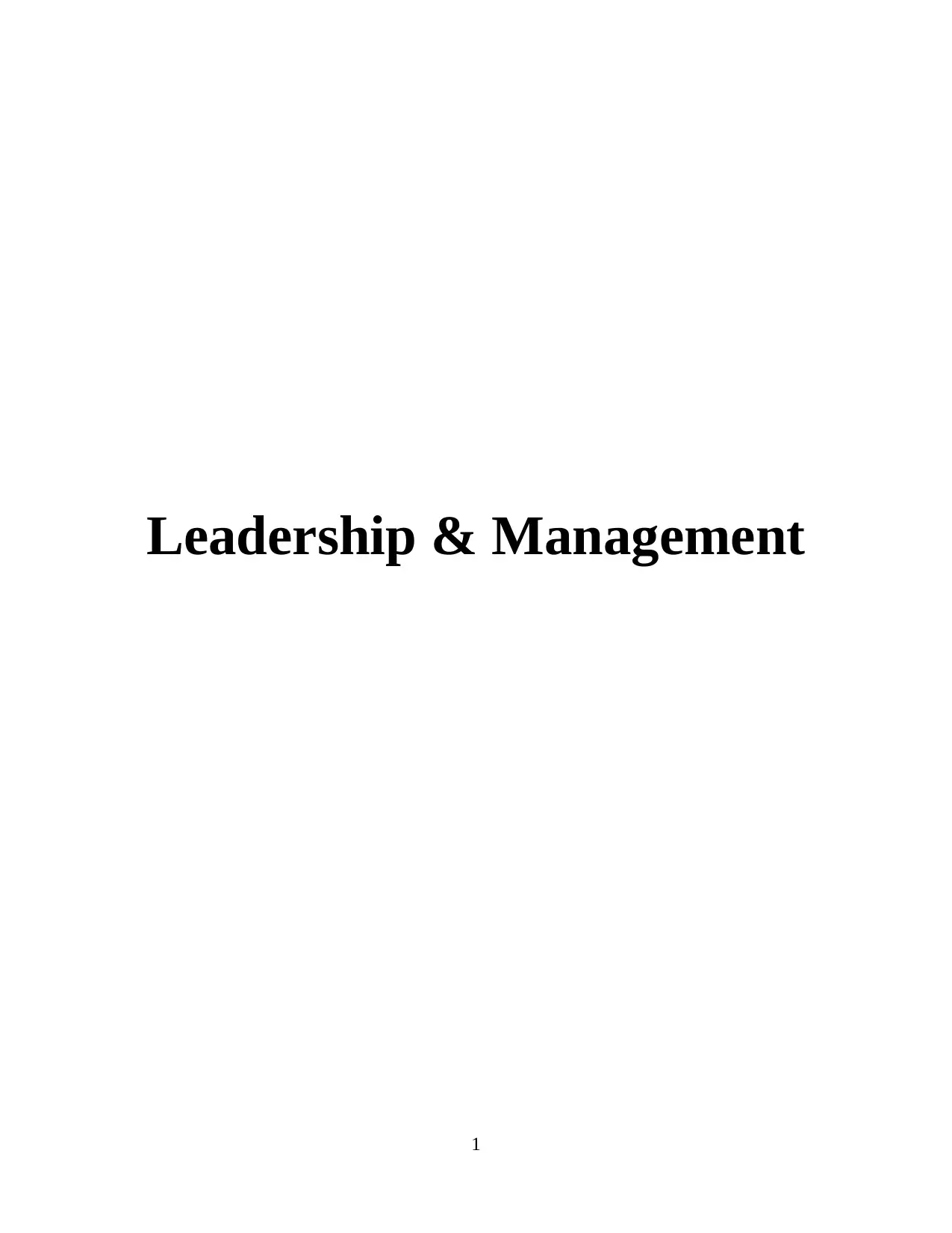
Leadership & Management
1
1
Paraphrase This Document
Need a fresh take? Get an instant paraphrase of this document with our AI Paraphraser
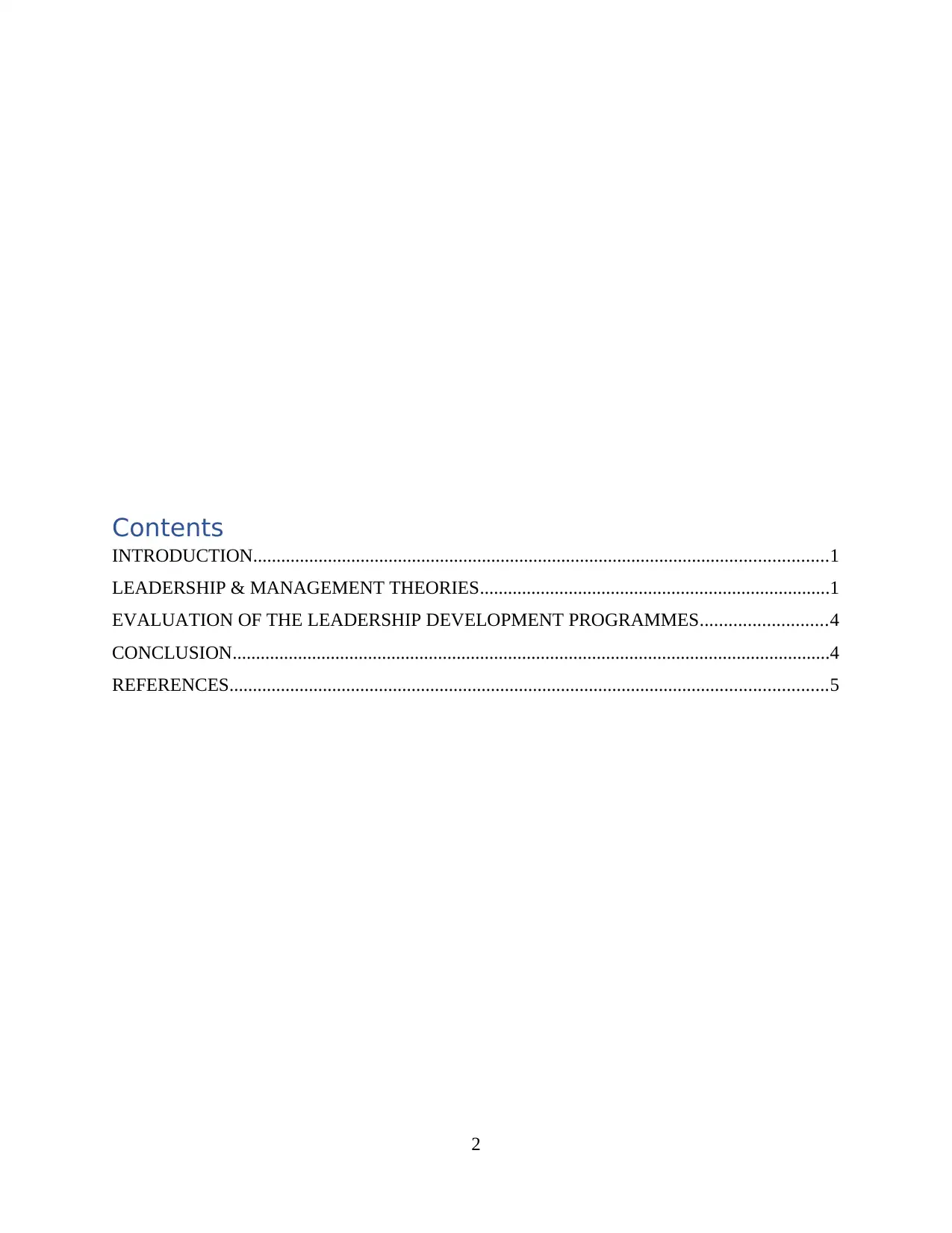
Contents
INTRODUCTION...........................................................................................................................1
LEADERSHIP & MANAGEMENT THEORIES...........................................................................1
EVALUATION OF THE LEADERSHIP DEVELOPMENT PROGRAMMES...........................4
CONCLUSION................................................................................................................................4
REFERENCES................................................................................................................................5
2
INTRODUCTION...........................................................................................................................1
LEADERSHIP & MANAGEMENT THEORIES...........................................................................1
EVALUATION OF THE LEADERSHIP DEVELOPMENT PROGRAMMES...........................4
CONCLUSION................................................................................................................................4
REFERENCES................................................................................................................................5
2
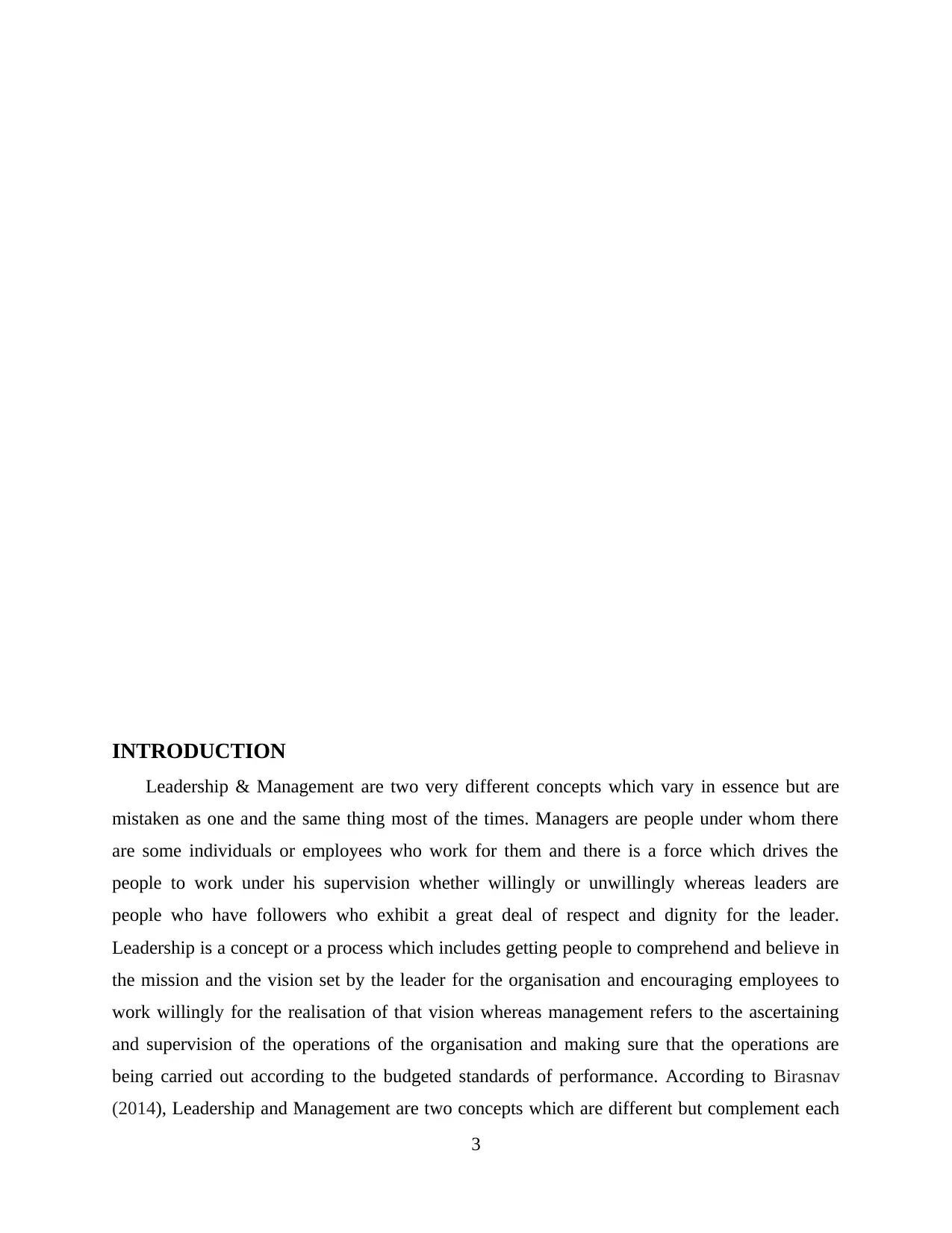
INTRODUCTION
Leadership & Management are two very different concepts which vary in essence but are
mistaken as one and the same thing most of the times. Managers are people under whom there
are some individuals or employees who work for them and there is a force which drives the
people to work under his supervision whether willingly or unwillingly whereas leaders are
people who have followers who exhibit a great deal of respect and dignity for the leader.
Leadership is a concept or a process which includes getting people to comprehend and believe in
the mission and the vision set by the leader for the organisation and encouraging employees to
work willingly for the realisation of that vision whereas management refers to the ascertaining
and supervision of the operations of the organisation and making sure that the operations are
being carried out according to the budgeted standards of performance. According to Birasnav
(2014), Leadership and Management are two concepts which are different but complement each
3
Leadership & Management are two very different concepts which vary in essence but are
mistaken as one and the same thing most of the times. Managers are people under whom there
are some individuals or employees who work for them and there is a force which drives the
people to work under his supervision whether willingly or unwillingly whereas leaders are
people who have followers who exhibit a great deal of respect and dignity for the leader.
Leadership is a concept or a process which includes getting people to comprehend and believe in
the mission and the vision set by the leader for the organisation and encouraging employees to
work willingly for the realisation of that vision whereas management refers to the ascertaining
and supervision of the operations of the organisation and making sure that the operations are
being carried out according to the budgeted standards of performance. According to Birasnav
(2014), Leadership and Management are two concepts which are different but complement each
3
⊘ This is a preview!⊘
Do you want full access?
Subscribe today to unlock all pages.

Trusted by 1+ million students worldwide
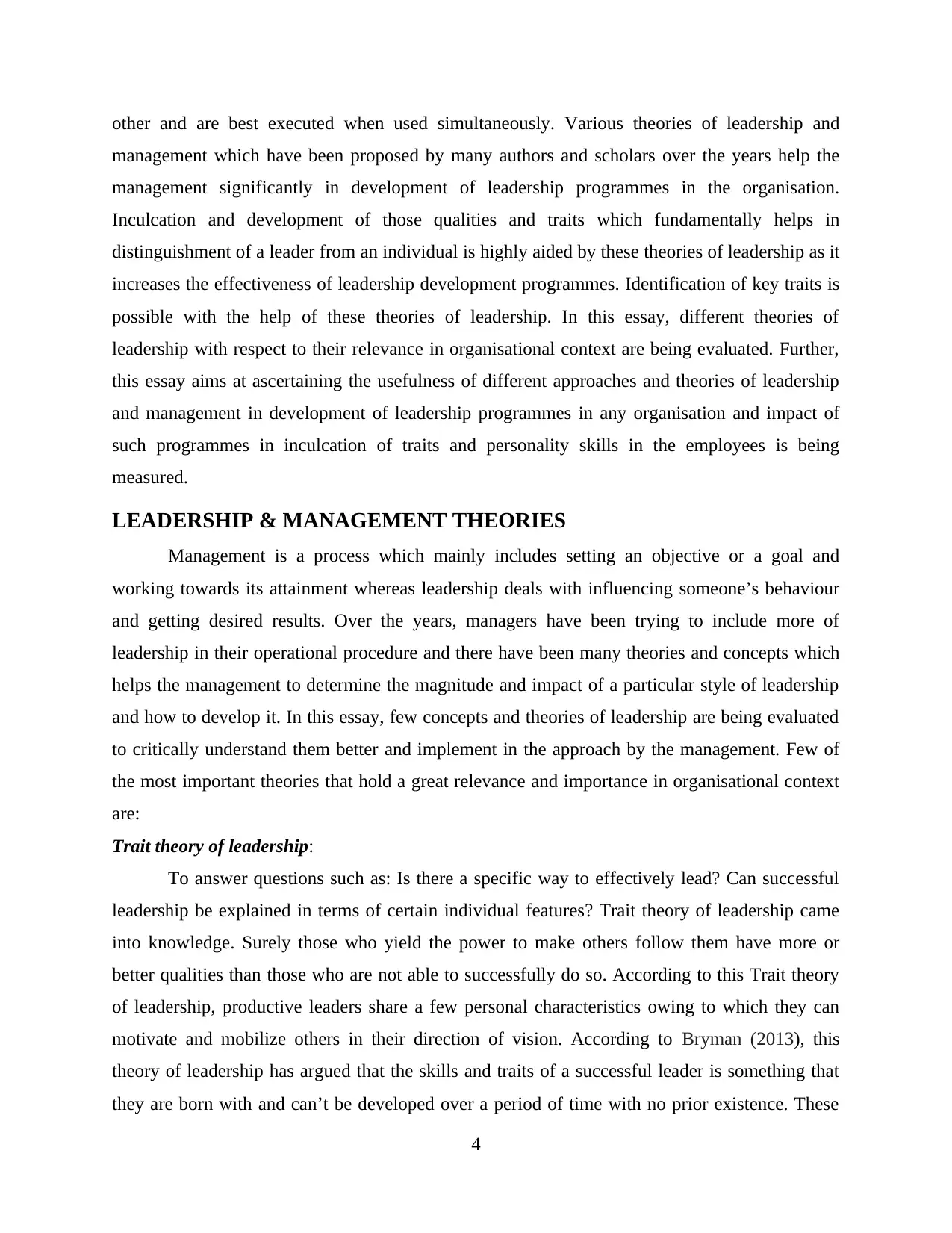
other and are best executed when used simultaneously. Various theories of leadership and
management which have been proposed by many authors and scholars over the years help the
management significantly in development of leadership programmes in the organisation.
Inculcation and development of those qualities and traits which fundamentally helps in
distinguishment of a leader from an individual is highly aided by these theories of leadership as it
increases the effectiveness of leadership development programmes. Identification of key traits is
possible with the help of these theories of leadership. In this essay, different theories of
leadership with respect to their relevance in organisational context are being evaluated. Further,
this essay aims at ascertaining the usefulness of different approaches and theories of leadership
and management in development of leadership programmes in any organisation and impact of
such programmes in inculcation of traits and personality skills in the employees is being
measured.
LEADERSHIP & MANAGEMENT THEORIES
Management is a process which mainly includes setting an objective or a goal and
working towards its attainment whereas leadership deals with influencing someone’s behaviour
and getting desired results. Over the years, managers have been trying to include more of
leadership in their operational procedure and there have been many theories and concepts which
helps the management to determine the magnitude and impact of a particular style of leadership
and how to develop it. In this essay, few concepts and theories of leadership are being evaluated
to critically understand them better and implement in the approach by the management. Few of
the most important theories that hold a great relevance and importance in organisational context
are:
Trait theory of leadership:
To answer questions such as: Is there a specific way to effectively lead? Can successful
leadership be explained in terms of certain individual features? Trait theory of leadership came
into knowledge. Surely those who yield the power to make others follow them have more or
better qualities than those who are not able to successfully do so. According to this Trait theory
of leadership, productive leaders share a few personal characteristics owing to which they can
motivate and mobilize others in their direction of vision. According to Bryman (2013), this
theory of leadership has argued that the skills and traits of a successful leader is something that
they are born with and can’t be developed over a period of time with no prior existence. These
4
management which have been proposed by many authors and scholars over the years help the
management significantly in development of leadership programmes in the organisation.
Inculcation and development of those qualities and traits which fundamentally helps in
distinguishment of a leader from an individual is highly aided by these theories of leadership as it
increases the effectiveness of leadership development programmes. Identification of key traits is
possible with the help of these theories of leadership. In this essay, different theories of
leadership with respect to their relevance in organisational context are being evaluated. Further,
this essay aims at ascertaining the usefulness of different approaches and theories of leadership
and management in development of leadership programmes in any organisation and impact of
such programmes in inculcation of traits and personality skills in the employees is being
measured.
LEADERSHIP & MANAGEMENT THEORIES
Management is a process which mainly includes setting an objective or a goal and
working towards its attainment whereas leadership deals with influencing someone’s behaviour
and getting desired results. Over the years, managers have been trying to include more of
leadership in their operational procedure and there have been many theories and concepts which
helps the management to determine the magnitude and impact of a particular style of leadership
and how to develop it. In this essay, few concepts and theories of leadership are being evaluated
to critically understand them better and implement in the approach by the management. Few of
the most important theories that hold a great relevance and importance in organisational context
are:
Trait theory of leadership:
To answer questions such as: Is there a specific way to effectively lead? Can successful
leadership be explained in terms of certain individual features? Trait theory of leadership came
into knowledge. Surely those who yield the power to make others follow them have more or
better qualities than those who are not able to successfully do so. According to this Trait theory
of leadership, productive leaders share a few personal characteristics owing to which they can
motivate and mobilize others in their direction of vision. According to Bryman (2013), this
theory of leadership has argued that the skills and traits of a successful leader is something that
they are born with and can’t be developed over a period of time with no prior existence. These
4
Paraphrase This Document
Need a fresh take? Get an instant paraphrase of this document with our AI Paraphraser
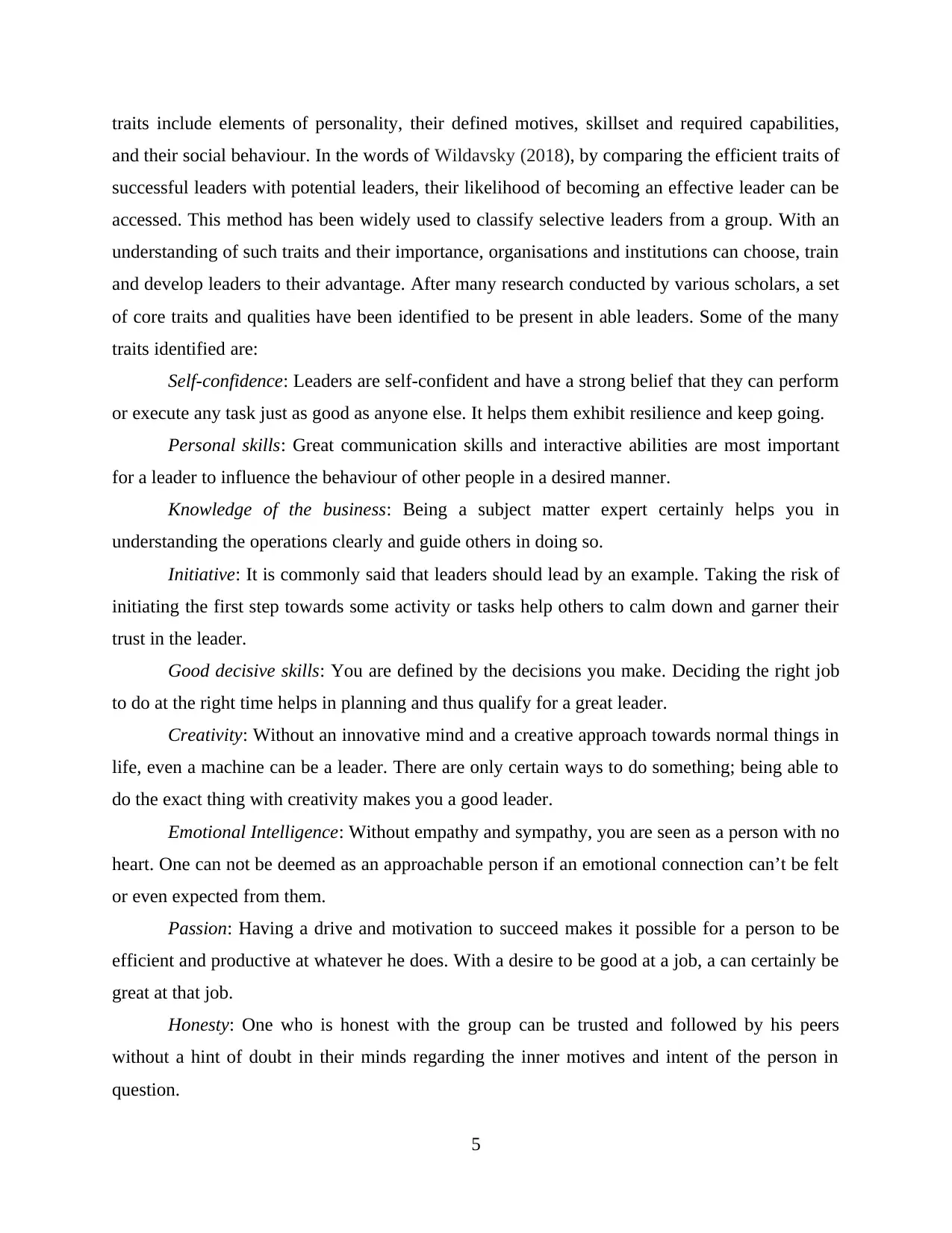
traits include elements of personality, their defined motives, skillset and required capabilities,
and their social behaviour. In the words of Wildavsky (2018), by comparing the efficient traits of
successful leaders with potential leaders, their likelihood of becoming an effective leader can be
accessed. This method has been widely used to classify selective leaders from a group. With an
understanding of such traits and their importance, organisations and institutions can choose, train
and develop leaders to their advantage. After many research conducted by various scholars, a set
of core traits and qualities have been identified to be present in able leaders. Some of the many
traits identified are:
Self-confidence: Leaders are self-confident and have a strong belief that they can perform
or execute any task just as good as anyone else. It helps them exhibit resilience and keep going.
Personal skills: Great communication skills and interactive abilities are most important
for a leader to influence the behaviour of other people in a desired manner.
Knowledge of the business: Being a subject matter expert certainly helps you in
understanding the operations clearly and guide others in doing so.
Initiative: It is commonly said that leaders should lead by an example. Taking the risk of
initiating the first step towards some activity or tasks help others to calm down and garner their
trust in the leader.
Good decisive skills: You are defined by the decisions you make. Deciding the right job
to do at the right time helps in planning and thus qualify for a great leader.
Creativity: Without an innovative mind and a creative approach towards normal things in
life, even a machine can be a leader. There are only certain ways to do something; being able to
do the exact thing with creativity makes you a good leader.
Emotional Intelligence: Without empathy and sympathy, you are seen as a person with no
heart. One can not be deemed as an approachable person if an emotional connection can’t be felt
or even expected from them.
Passion: Having a drive and motivation to succeed makes it possible for a person to be
efficient and productive at whatever he does. With a desire to be good at a job, a can certainly be
great at that job.
Honesty: One who is honest with the group can be trusted and followed by his peers
without a hint of doubt in their minds regarding the inner motives and intent of the person in
question.
5
and their social behaviour. In the words of Wildavsky (2018), by comparing the efficient traits of
successful leaders with potential leaders, their likelihood of becoming an effective leader can be
accessed. This method has been widely used to classify selective leaders from a group. With an
understanding of such traits and their importance, organisations and institutions can choose, train
and develop leaders to their advantage. After many research conducted by various scholars, a set
of core traits and qualities have been identified to be present in able leaders. Some of the many
traits identified are:
Self-confidence: Leaders are self-confident and have a strong belief that they can perform
or execute any task just as good as anyone else. It helps them exhibit resilience and keep going.
Personal skills: Great communication skills and interactive abilities are most important
for a leader to influence the behaviour of other people in a desired manner.
Knowledge of the business: Being a subject matter expert certainly helps you in
understanding the operations clearly and guide others in doing so.
Initiative: It is commonly said that leaders should lead by an example. Taking the risk of
initiating the first step towards some activity or tasks help others to calm down and garner their
trust in the leader.
Good decisive skills: You are defined by the decisions you make. Deciding the right job
to do at the right time helps in planning and thus qualify for a great leader.
Creativity: Without an innovative mind and a creative approach towards normal things in
life, even a machine can be a leader. There are only certain ways to do something; being able to
do the exact thing with creativity makes you a good leader.
Emotional Intelligence: Without empathy and sympathy, you are seen as a person with no
heart. One can not be deemed as an approachable person if an emotional connection can’t be felt
or even expected from them.
Passion: Having a drive and motivation to succeed makes it possible for a person to be
efficient and productive at whatever he does. With a desire to be good at a job, a can certainly be
great at that job.
Honesty: One who is honest with the group can be trusted and followed by his peers
without a hint of doubt in their minds regarding the inner motives and intent of the person in
question.
5
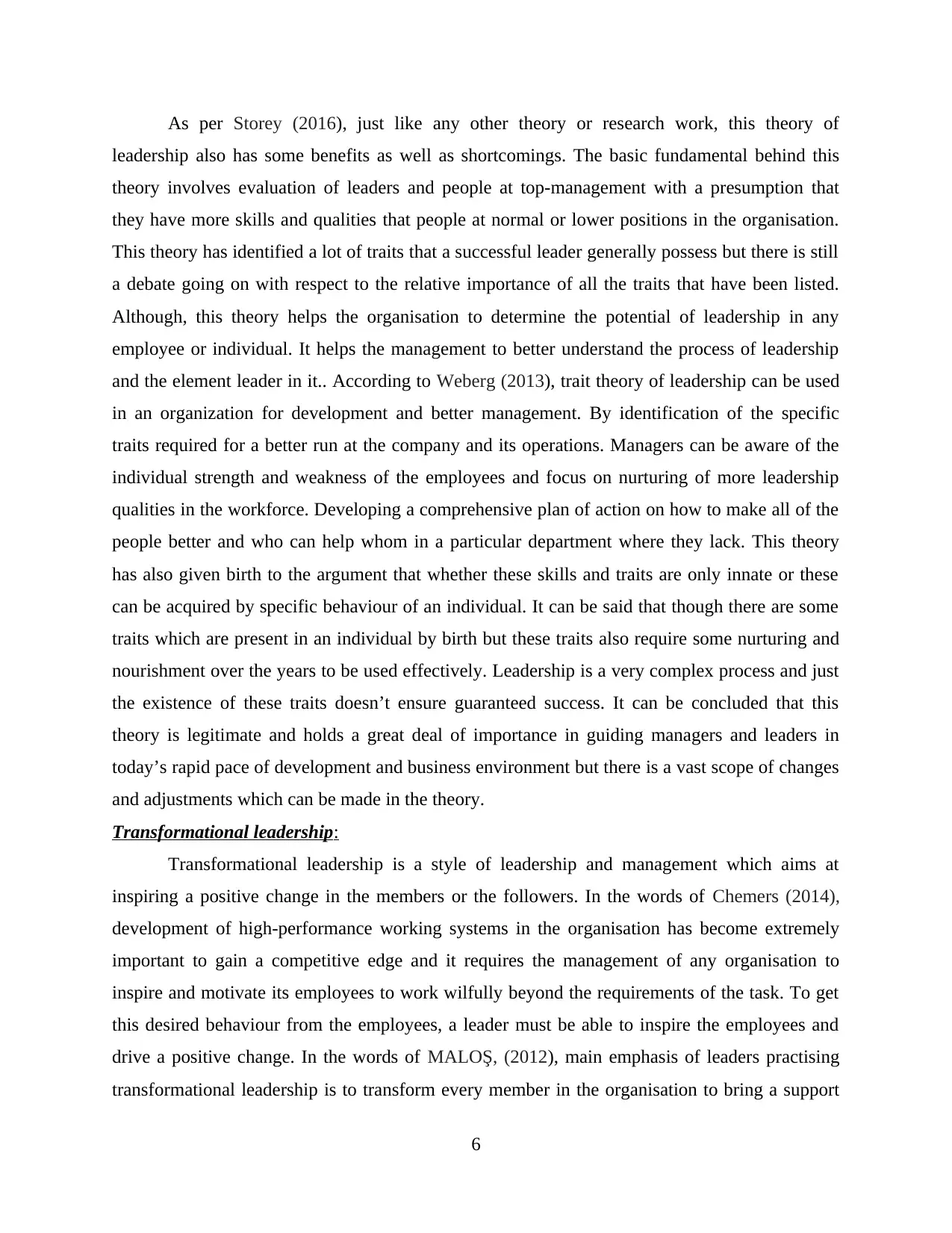
As per Storey (2016), just like any other theory or research work, this theory of
leadership also has some benefits as well as shortcomings. The basic fundamental behind this
theory involves evaluation of leaders and people at top-management with a presumption that
they have more skills and qualities that people at normal or lower positions in the organisation.
This theory has identified a lot of traits that a successful leader generally possess but there is still
a debate going on with respect to the relative importance of all the traits that have been listed.
Although, this theory helps the organisation to determine the potential of leadership in any
employee or individual. It helps the management to better understand the process of leadership
and the element leader in it.. According to Weberg (2013), trait theory of leadership can be used
in an organization for development and better management. By identification of the specific
traits required for a better run at the company and its operations. Managers can be aware of the
individual strength and weakness of the employees and focus on nurturing of more leadership
qualities in the workforce. Developing a comprehensive plan of action on how to make all of the
people better and who can help whom in a particular department where they lack. This theory
has also given birth to the argument that whether these skills and traits are only innate or these
can be acquired by specific behaviour of an individual. It can be said that though there are some
traits which are present in an individual by birth but these traits also require some nurturing and
nourishment over the years to be used effectively. Leadership is a very complex process and just
the existence of these traits doesn’t ensure guaranteed success. It can be concluded that this
theory is legitimate and holds a great deal of importance in guiding managers and leaders in
today’s rapid pace of development and business environment but there is a vast scope of changes
and adjustments which can be made in the theory.
Transformational leadership:
Transformational leadership is a style of leadership and management which aims at
inspiring a positive change in the members or the followers. In the words of Chemers (2014),
development of high-performance working systems in the organisation has become extremely
important to gain a competitive edge and it requires the management of any organisation to
inspire and motivate its employees to work wilfully beyond the requirements of the task. To get
this desired behaviour from the employees, a leader must be able to inspire the employees and
drive a positive change. In the words of MALOŞ, (2012), main emphasis of leaders practising
transformational leadership is to transform every member in the organisation to bring a support
6
leadership also has some benefits as well as shortcomings. The basic fundamental behind this
theory involves evaluation of leaders and people at top-management with a presumption that
they have more skills and qualities that people at normal or lower positions in the organisation.
This theory has identified a lot of traits that a successful leader generally possess but there is still
a debate going on with respect to the relative importance of all the traits that have been listed.
Although, this theory helps the organisation to determine the potential of leadership in any
employee or individual. It helps the management to better understand the process of leadership
and the element leader in it.. According to Weberg (2013), trait theory of leadership can be used
in an organization for development and better management. By identification of the specific
traits required for a better run at the company and its operations. Managers can be aware of the
individual strength and weakness of the employees and focus on nurturing of more leadership
qualities in the workforce. Developing a comprehensive plan of action on how to make all of the
people better and who can help whom in a particular department where they lack. This theory
has also given birth to the argument that whether these skills and traits are only innate or these
can be acquired by specific behaviour of an individual. It can be said that though there are some
traits which are present in an individual by birth but these traits also require some nurturing and
nourishment over the years to be used effectively. Leadership is a very complex process and just
the existence of these traits doesn’t ensure guaranteed success. It can be concluded that this
theory is legitimate and holds a great deal of importance in guiding managers and leaders in
today’s rapid pace of development and business environment but there is a vast scope of changes
and adjustments which can be made in the theory.
Transformational leadership:
Transformational leadership is a style of leadership and management which aims at
inspiring a positive change in the members or the followers. In the words of Chemers (2014),
development of high-performance working systems in the organisation has become extremely
important to gain a competitive edge and it requires the management of any organisation to
inspire and motivate its employees to work wilfully beyond the requirements of the task. To get
this desired behaviour from the employees, a leader must be able to inspire the employees and
drive a positive change. In the words of MALOŞ, (2012), main emphasis of leaders practising
transformational leadership is to transform every member in the organisation to bring a support
6
⊘ This is a preview!⊘
Do you want full access?
Subscribe today to unlock all pages.

Trusted by 1+ million students worldwide
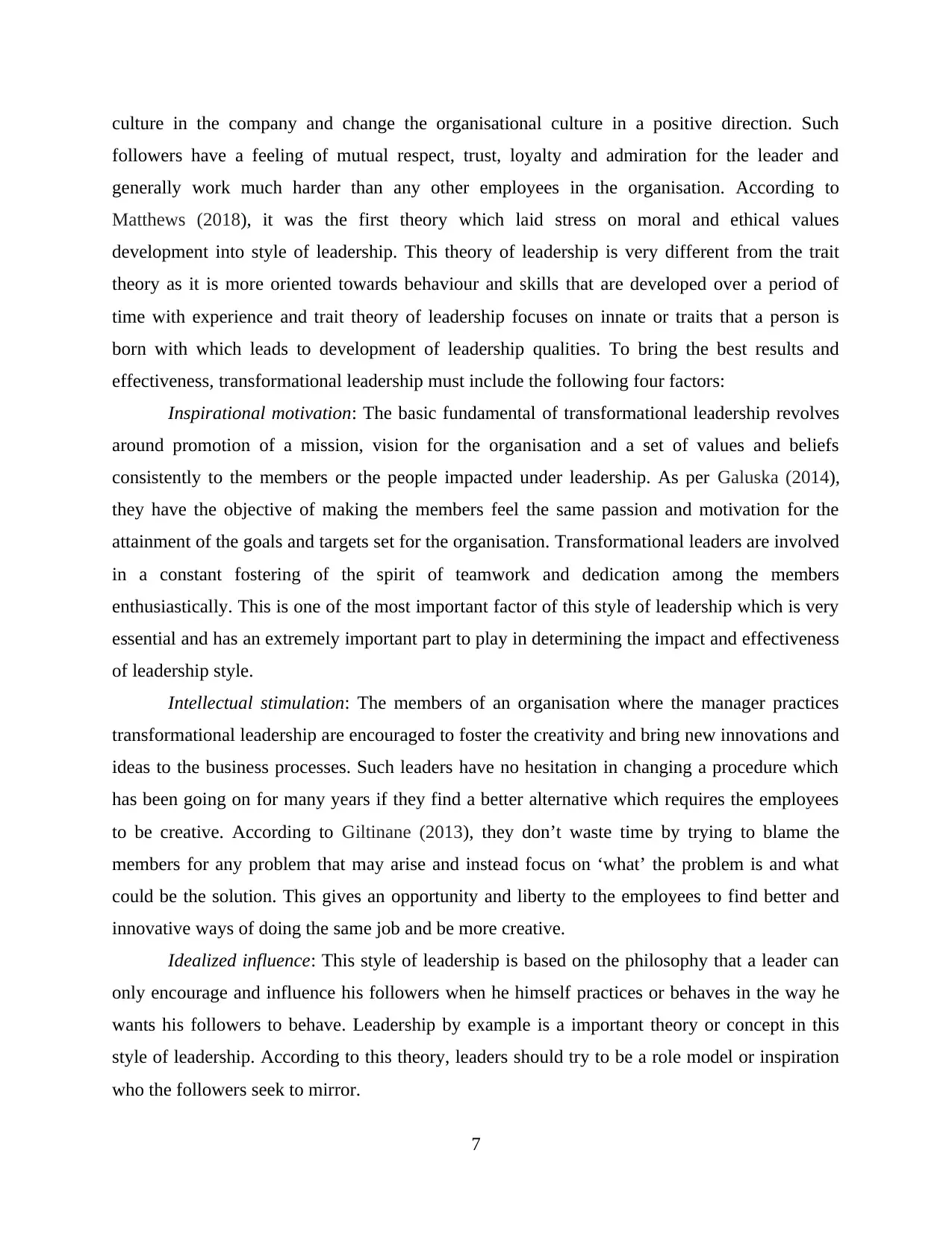
culture in the company and change the organisational culture in a positive direction. Such
followers have a feeling of mutual respect, trust, loyalty and admiration for the leader and
generally work much harder than any other employees in the organisation. According to
Matthews (2018), it was the first theory which laid stress on moral and ethical values
development into style of leadership. This theory of leadership is very different from the trait
theory as it is more oriented towards behaviour and skills that are developed over a period of
time with experience and trait theory of leadership focuses on innate or traits that a person is
born with which leads to development of leadership qualities. To bring the best results and
effectiveness, transformational leadership must include the following four factors:
Inspirational motivation: The basic fundamental of transformational leadership revolves
around promotion of a mission, vision for the organisation and a set of values and beliefs
consistently to the members or the people impacted under leadership. As per Galuska (2014),
they have the objective of making the members feel the same passion and motivation for the
attainment of the goals and targets set for the organisation. Transformational leaders are involved
in a constant fostering of the spirit of teamwork and dedication among the members
enthusiastically. This is one of the most important factor of this style of leadership which is very
essential and has an extremely important part to play in determining the impact and effectiveness
of leadership style.
Intellectual stimulation: The members of an organisation where the manager practices
transformational leadership are encouraged to foster the creativity and bring new innovations and
ideas to the business processes. Such leaders have no hesitation in changing a procedure which
has been going on for many years if they find a better alternative which requires the employees
to be creative. According to Giltinane (2013), they don’t waste time by trying to blame the
members for any problem that may arise and instead focus on ‘what’ the problem is and what
could be the solution. This gives an opportunity and liberty to the employees to find better and
innovative ways of doing the same job and be more creative.
Idealized influence: This style of leadership is based on the philosophy that a leader can
only encourage and influence his followers when he himself practices or behaves in the way he
wants his followers to behave. Leadership by example is a important theory or concept in this
style of leadership. According to this theory, leaders should try to be a role model or inspiration
who the followers seek to mirror.
7
followers have a feeling of mutual respect, trust, loyalty and admiration for the leader and
generally work much harder than any other employees in the organisation. According to
Matthews (2018), it was the first theory which laid stress on moral and ethical values
development into style of leadership. This theory of leadership is very different from the trait
theory as it is more oriented towards behaviour and skills that are developed over a period of
time with experience and trait theory of leadership focuses on innate or traits that a person is
born with which leads to development of leadership qualities. To bring the best results and
effectiveness, transformational leadership must include the following four factors:
Inspirational motivation: The basic fundamental of transformational leadership revolves
around promotion of a mission, vision for the organisation and a set of values and beliefs
consistently to the members or the people impacted under leadership. As per Galuska (2014),
they have the objective of making the members feel the same passion and motivation for the
attainment of the goals and targets set for the organisation. Transformational leaders are involved
in a constant fostering of the spirit of teamwork and dedication among the members
enthusiastically. This is one of the most important factor of this style of leadership which is very
essential and has an extremely important part to play in determining the impact and effectiveness
of leadership style.
Intellectual stimulation: The members of an organisation where the manager practices
transformational leadership are encouraged to foster the creativity and bring new innovations and
ideas to the business processes. Such leaders have no hesitation in changing a procedure which
has been going on for many years if they find a better alternative which requires the employees
to be creative. According to Giltinane (2013), they don’t waste time by trying to blame the
members for any problem that may arise and instead focus on ‘what’ the problem is and what
could be the solution. This gives an opportunity and liberty to the employees to find better and
innovative ways of doing the same job and be more creative.
Idealized influence: This style of leadership is based on the philosophy that a leader can
only encourage and influence his followers when he himself practices or behaves in the way he
wants his followers to behave. Leadership by example is a important theory or concept in this
style of leadership. According to this theory, leaders should try to be a role model or inspiration
who the followers seek to mirror.
7
Paraphrase This Document
Need a fresh take? Get an instant paraphrase of this document with our AI Paraphraser
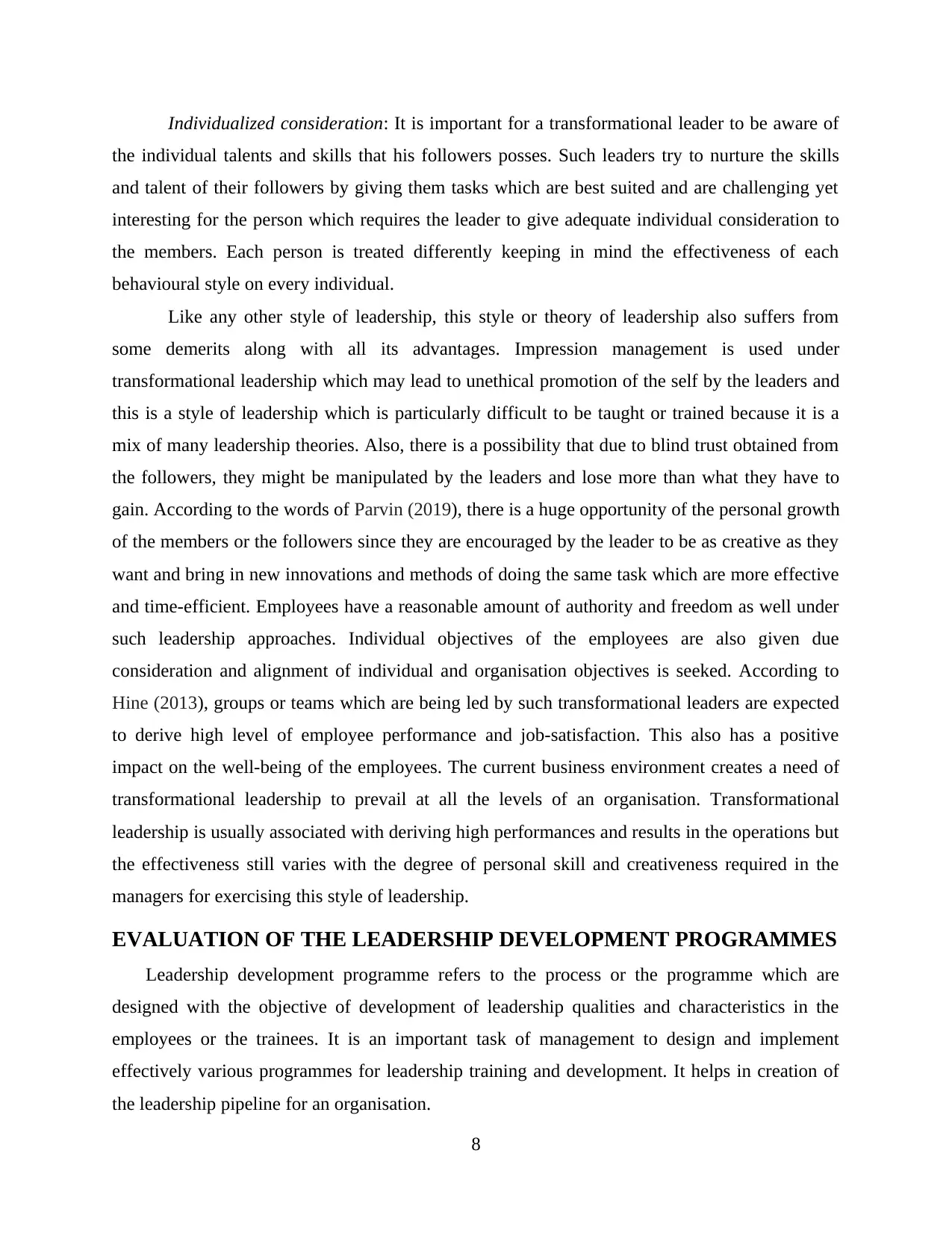
Individualized consideration: It is important for a transformational leader to be aware of
the individual talents and skills that his followers posses. Such leaders try to nurture the skills
and talent of their followers by giving them tasks which are best suited and are challenging yet
interesting for the person which requires the leader to give adequate individual consideration to
the members. Each person is treated differently keeping in mind the effectiveness of each
behavioural style on every individual.
Like any other style of leadership, this style or theory of leadership also suffers from
some demerits along with all its advantages. Impression management is used under
transformational leadership which may lead to unethical promotion of the self by the leaders and
this is a style of leadership which is particularly difficult to be taught or trained because it is a
mix of many leadership theories. Also, there is a possibility that due to blind trust obtained from
the followers, they might be manipulated by the leaders and lose more than what they have to
gain. According to the words of Parvin (2019), there is a huge opportunity of the personal growth
of the members or the followers since they are encouraged by the leader to be as creative as they
want and bring in new innovations and methods of doing the same task which are more effective
and time-efficient. Employees have a reasonable amount of authority and freedom as well under
such leadership approaches. Individual objectives of the employees are also given due
consideration and alignment of individual and organisation objectives is seeked. According to
Hine (2013), groups or teams which are being led by such transformational leaders are expected
to derive high level of employee performance and job-satisfaction. This also has a positive
impact on the well-being of the employees. The current business environment creates a need of
transformational leadership to prevail at all the levels of an organisation. Transformational
leadership is usually associated with deriving high performances and results in the operations but
the effectiveness still varies with the degree of personal skill and creativeness required in the
managers for exercising this style of leadership.
EVALUATION OF THE LEADERSHIP DEVELOPMENT PROGRAMMES
Leadership development programme refers to the process or the programme which are
designed with the objective of development of leadership qualities and characteristics in the
employees or the trainees. It is an important task of management to design and implement
effectively various programmes for leadership training and development. It helps in creation of
the leadership pipeline for an organisation.
8
the individual talents and skills that his followers posses. Such leaders try to nurture the skills
and talent of their followers by giving them tasks which are best suited and are challenging yet
interesting for the person which requires the leader to give adequate individual consideration to
the members. Each person is treated differently keeping in mind the effectiveness of each
behavioural style on every individual.
Like any other style of leadership, this style or theory of leadership also suffers from
some demerits along with all its advantages. Impression management is used under
transformational leadership which may lead to unethical promotion of the self by the leaders and
this is a style of leadership which is particularly difficult to be taught or trained because it is a
mix of many leadership theories. Also, there is a possibility that due to blind trust obtained from
the followers, they might be manipulated by the leaders and lose more than what they have to
gain. According to the words of Parvin (2019), there is a huge opportunity of the personal growth
of the members or the followers since they are encouraged by the leader to be as creative as they
want and bring in new innovations and methods of doing the same task which are more effective
and time-efficient. Employees have a reasonable amount of authority and freedom as well under
such leadership approaches. Individual objectives of the employees are also given due
consideration and alignment of individual and organisation objectives is seeked. According to
Hine (2013), groups or teams which are being led by such transformational leaders are expected
to derive high level of employee performance and job-satisfaction. This also has a positive
impact on the well-being of the employees. The current business environment creates a need of
transformational leadership to prevail at all the levels of an organisation. Transformational
leadership is usually associated with deriving high performances and results in the operations but
the effectiveness still varies with the degree of personal skill and creativeness required in the
managers for exercising this style of leadership.
EVALUATION OF THE LEADERSHIP DEVELOPMENT PROGRAMMES
Leadership development programme refers to the process or the programme which are
designed with the objective of development of leadership qualities and characteristics in the
employees or the trainees. It is an important task of management to design and implement
effectively various programmes for leadership training and development. It helps in creation of
the leadership pipeline for an organisation.
8
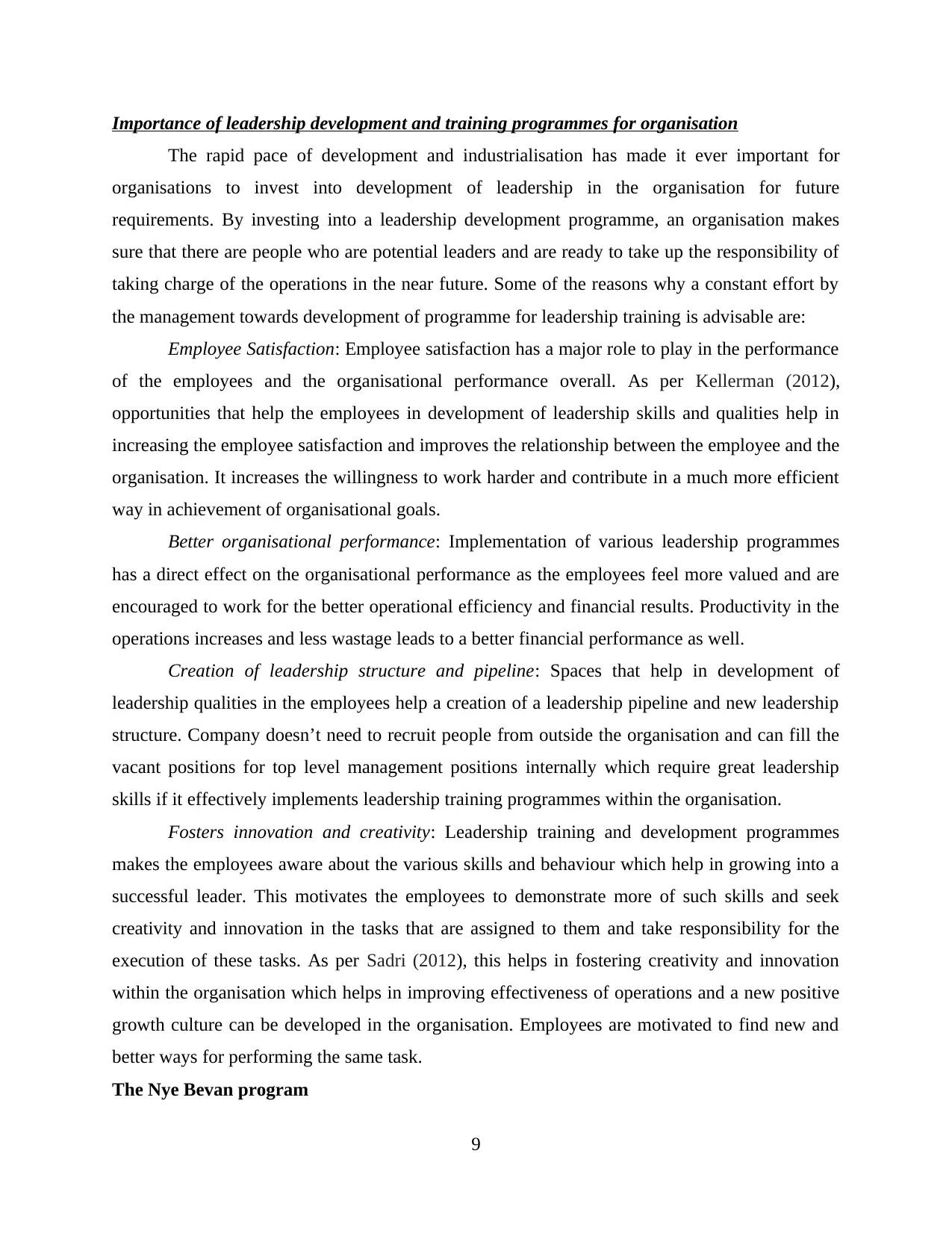
Importance of leadership development and training programmes for organisation
The rapid pace of development and industrialisation has made it ever important for
organisations to invest into development of leadership in the organisation for future
requirements. By investing into a leadership development programme, an organisation makes
sure that there are people who are potential leaders and are ready to take up the responsibility of
taking charge of the operations in the near future. Some of the reasons why a constant effort by
the management towards development of programme for leadership training is advisable are:
Employee Satisfaction: Employee satisfaction has a major role to play in the performance
of the employees and the organisational performance overall. As per Kellerman (2012),
opportunities that help the employees in development of leadership skills and qualities help in
increasing the employee satisfaction and improves the relationship between the employee and the
organisation. It increases the willingness to work harder and contribute in a much more efficient
way in achievement of organisational goals.
Better organisational performance: Implementation of various leadership programmes
has a direct effect on the organisational performance as the employees feel more valued and are
encouraged to work for the better operational efficiency and financial results. Productivity in the
operations increases and less wastage leads to a better financial performance as well.
Creation of leadership structure and pipeline: Spaces that help in development of
leadership qualities in the employees help a creation of a leadership pipeline and new leadership
structure. Company doesn’t need to recruit people from outside the organisation and can fill the
vacant positions for top level management positions internally which require great leadership
skills if it effectively implements leadership training programmes within the organisation.
Fosters innovation and creativity: Leadership training and development programmes
makes the employees aware about the various skills and behaviour which help in growing into a
successful leader. This motivates the employees to demonstrate more of such skills and seek
creativity and innovation in the tasks that are assigned to them and take responsibility for the
execution of these tasks. As per Sadri (2012), this helps in fostering creativity and innovation
within the organisation which helps in improving effectiveness of operations and a new positive
growth culture can be developed in the organisation. Employees are motivated to find new and
better ways for performing the same task.
The Nye Bevan program
9
The rapid pace of development and industrialisation has made it ever important for
organisations to invest into development of leadership in the organisation for future
requirements. By investing into a leadership development programme, an organisation makes
sure that there are people who are potential leaders and are ready to take up the responsibility of
taking charge of the operations in the near future. Some of the reasons why a constant effort by
the management towards development of programme for leadership training is advisable are:
Employee Satisfaction: Employee satisfaction has a major role to play in the performance
of the employees and the organisational performance overall. As per Kellerman (2012),
opportunities that help the employees in development of leadership skills and qualities help in
increasing the employee satisfaction and improves the relationship between the employee and the
organisation. It increases the willingness to work harder and contribute in a much more efficient
way in achievement of organisational goals.
Better organisational performance: Implementation of various leadership programmes
has a direct effect on the organisational performance as the employees feel more valued and are
encouraged to work for the better operational efficiency and financial results. Productivity in the
operations increases and less wastage leads to a better financial performance as well.
Creation of leadership structure and pipeline: Spaces that help in development of
leadership qualities in the employees help a creation of a leadership pipeline and new leadership
structure. Company doesn’t need to recruit people from outside the organisation and can fill the
vacant positions for top level management positions internally which require great leadership
skills if it effectively implements leadership training programmes within the organisation.
Fosters innovation and creativity: Leadership training and development programmes
makes the employees aware about the various skills and behaviour which help in growing into a
successful leader. This motivates the employees to demonstrate more of such skills and seek
creativity and innovation in the tasks that are assigned to them and take responsibility for the
execution of these tasks. As per Sadri (2012), this helps in fostering creativity and innovation
within the organisation which helps in improving effectiveness of operations and a new positive
growth culture can be developed in the organisation. Employees are motivated to find new and
better ways for performing the same task.
The Nye Bevan program
9
⊘ This is a preview!⊘
Do you want full access?
Subscribe today to unlock all pages.

Trusted by 1+ million students worldwide
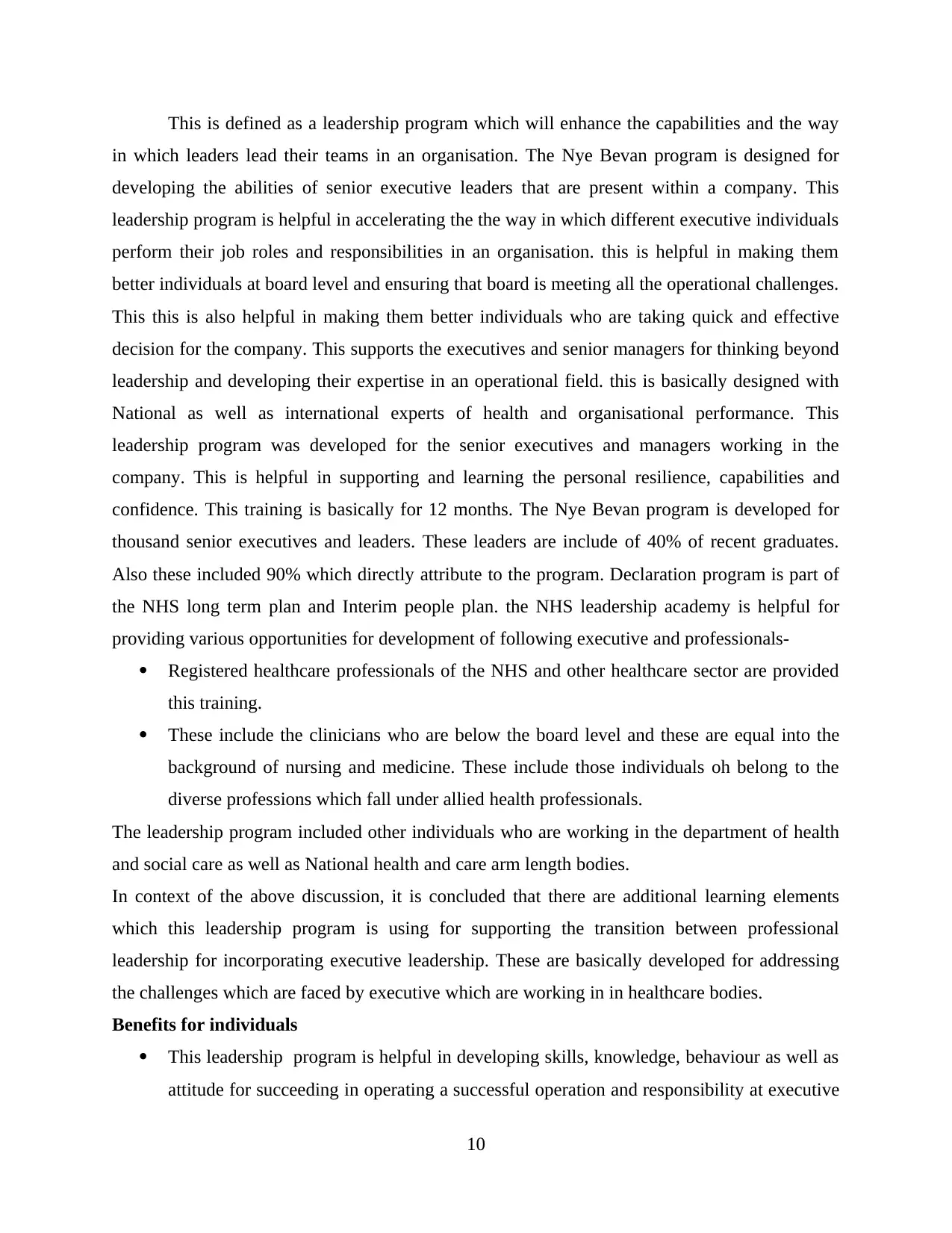
This is defined as a leadership program which will enhance the capabilities and the way
in which leaders lead their teams in an organisation. The Nye Bevan program is designed for
developing the abilities of senior executive leaders that are present within a company. This
leadership program is helpful in accelerating the the way in which different executive individuals
perform their job roles and responsibilities in an organisation. this is helpful in making them
better individuals at board level and ensuring that board is meeting all the operational challenges.
This this is also helpful in making them better individuals who are taking quick and effective
decision for the company. This supports the executives and senior managers for thinking beyond
leadership and developing their expertise in an operational field. this is basically designed with
National as well as international experts of health and organisational performance. This
leadership program was developed for the senior executives and managers working in the
company. This is helpful in supporting and learning the personal resilience, capabilities and
confidence. This training is basically for 12 months. The Nye Bevan program is developed for
thousand senior executives and leaders. These leaders are include of 40% of recent graduates.
Also these included 90% which directly attribute to the program. Declaration program is part of
the NHS long term plan and Interim people plan. the NHS leadership academy is helpful for
providing various opportunities for development of following executive and professionals-
Registered healthcare professionals of the NHS and other healthcare sector are provided
this training.
These include the clinicians who are below the board level and these are equal into the
background of nursing and medicine. These include those individuals oh belong to the
diverse professions which fall under allied health professionals.
The leadership program included other individuals who are working in the department of health
and social care as well as National health and care arm length bodies.
In context of the above discussion, it is concluded that there are additional learning elements
which this leadership program is using for supporting the transition between professional
leadership for incorporating executive leadership. These are basically developed for addressing
the challenges which are faced by executive which are working in in healthcare bodies.
Benefits for individuals
This leadership program is helpful in developing skills, knowledge, behaviour as well as
attitude for succeeding in operating a successful operation and responsibility at executive
10
in which leaders lead their teams in an organisation. The Nye Bevan program is designed for
developing the abilities of senior executive leaders that are present within a company. This
leadership program is helpful in accelerating the the way in which different executive individuals
perform their job roles and responsibilities in an organisation. this is helpful in making them
better individuals at board level and ensuring that board is meeting all the operational challenges.
This this is also helpful in making them better individuals who are taking quick and effective
decision for the company. This supports the executives and senior managers for thinking beyond
leadership and developing their expertise in an operational field. this is basically designed with
National as well as international experts of health and organisational performance. This
leadership program was developed for the senior executives and managers working in the
company. This is helpful in supporting and learning the personal resilience, capabilities and
confidence. This training is basically for 12 months. The Nye Bevan program is developed for
thousand senior executives and leaders. These leaders are include of 40% of recent graduates.
Also these included 90% which directly attribute to the program. Declaration program is part of
the NHS long term plan and Interim people plan. the NHS leadership academy is helpful for
providing various opportunities for development of following executive and professionals-
Registered healthcare professionals of the NHS and other healthcare sector are provided
this training.
These include the clinicians who are below the board level and these are equal into the
background of nursing and medicine. These include those individuals oh belong to the
diverse professions which fall under allied health professionals.
The leadership program included other individuals who are working in the department of health
and social care as well as National health and care arm length bodies.
In context of the above discussion, it is concluded that there are additional learning elements
which this leadership program is using for supporting the transition between professional
leadership for incorporating executive leadership. These are basically developed for addressing
the challenges which are faced by executive which are working in in healthcare bodies.
Benefits for individuals
This leadership program is helpful in developing skills, knowledge, behaviour as well as
attitude for succeeding in operating a successful operation and responsibility at executive
10
Paraphrase This Document
Need a fresh take? Get an instant paraphrase of this document with our AI Paraphraser
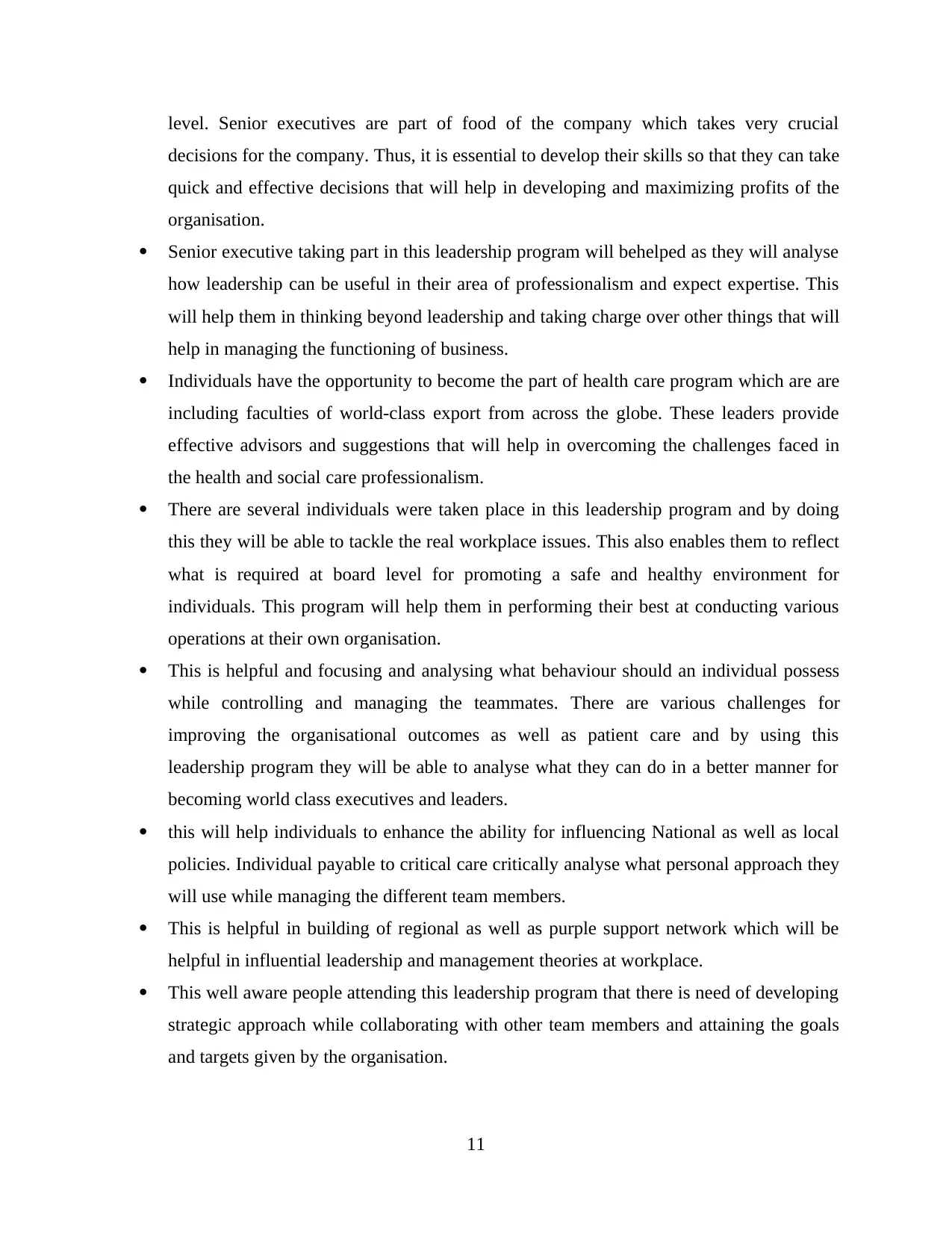
level. Senior executives are part of food of the company which takes very crucial
decisions for the company. Thus, it is essential to develop their skills so that they can take
quick and effective decisions that will help in developing and maximizing profits of the
organisation.
Senior executive taking part in this leadership program will behelped as they will analyse
how leadership can be useful in their area of professionalism and expect expertise. This
will help them in thinking beyond leadership and taking charge over other things that will
help in managing the functioning of business.
Individuals have the opportunity to become the part of health care program which are are
including faculties of world-class export from across the globe. These leaders provide
effective advisors and suggestions that will help in overcoming the challenges faced in
the health and social care professionalism.
There are several individuals were taken place in this leadership program and by doing
this they will be able to tackle the real workplace issues. This also enables them to reflect
what is required at board level for promoting a safe and healthy environment for
individuals. This program will help them in performing their best at conducting various
operations at their own organisation.
This is helpful and focusing and analysing what behaviour should an individual possess
while controlling and managing the teammates. There are various challenges for
improving the organisational outcomes as well as patient care and by using this
leadership program they will be able to analyse what they can do in a better manner for
becoming world class executives and leaders.
this will help individuals to enhance the ability for influencing National as well as local
policies. Individual payable to critical care critically analyse what personal approach they
will use while managing the different team members.
This is helpful in building of regional as well as purple support network which will be
helpful in influential leadership and management theories at workplace.
This well aware people attending this leadership program that there is need of developing
strategic approach while collaborating with other team members and attaining the goals
and targets given by the organisation.
11
decisions for the company. Thus, it is essential to develop their skills so that they can take
quick and effective decisions that will help in developing and maximizing profits of the
organisation.
Senior executive taking part in this leadership program will behelped as they will analyse
how leadership can be useful in their area of professionalism and expect expertise. This
will help them in thinking beyond leadership and taking charge over other things that will
help in managing the functioning of business.
Individuals have the opportunity to become the part of health care program which are are
including faculties of world-class export from across the globe. These leaders provide
effective advisors and suggestions that will help in overcoming the challenges faced in
the health and social care professionalism.
There are several individuals were taken place in this leadership program and by doing
this they will be able to tackle the real workplace issues. This also enables them to reflect
what is required at board level for promoting a safe and healthy environment for
individuals. This program will help them in performing their best at conducting various
operations at their own organisation.
This is helpful and focusing and analysing what behaviour should an individual possess
while controlling and managing the teammates. There are various challenges for
improving the organisational outcomes as well as patient care and by using this
leadership program they will be able to analyse what they can do in a better manner for
becoming world class executives and leaders.
this will help individuals to enhance the ability for influencing National as well as local
policies. Individual payable to critical care critically analyse what personal approach they
will use while managing the different team members.
This is helpful in building of regional as well as purple support network which will be
helpful in influential leadership and management theories at workplace.
This well aware people attending this leadership program that there is need of developing
strategic approach while collaborating with other team members and attaining the goals
and targets given by the organisation.
11
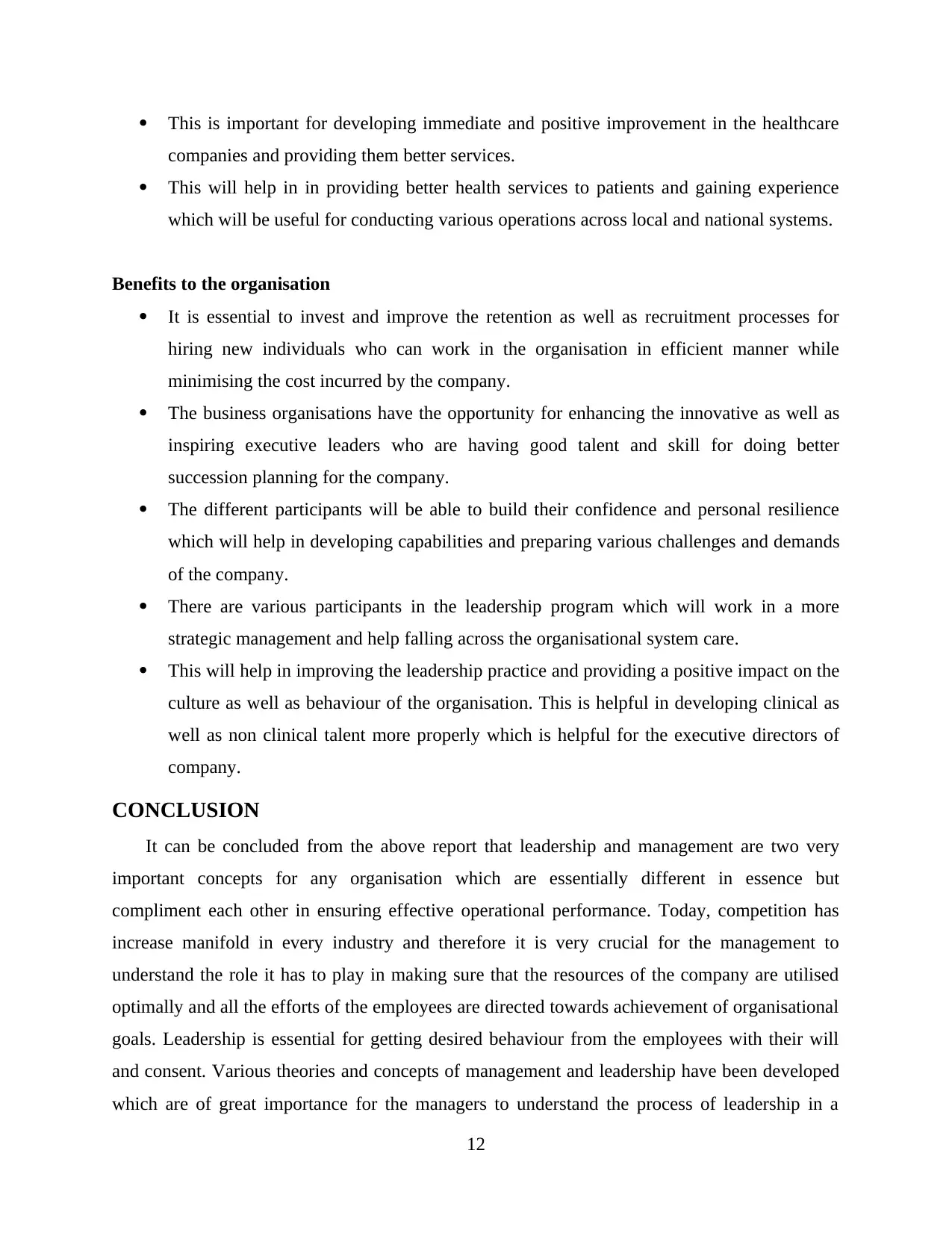
This is important for developing immediate and positive improvement in the healthcare
companies and providing them better services.
This will help in in providing better health services to patients and gaining experience
which will be useful for conducting various operations across local and national systems.
Benefits to the organisation
It is essential to invest and improve the retention as well as recruitment processes for
hiring new individuals who can work in the organisation in efficient manner while
minimising the cost incurred by the company.
The business organisations have the opportunity for enhancing the innovative as well as
inspiring executive leaders who are having good talent and skill for doing better
succession planning for the company.
The different participants will be able to build their confidence and personal resilience
which will help in developing capabilities and preparing various challenges and demands
of the company.
There are various participants in the leadership program which will work in a more
strategic management and help falling across the organisational system care.
This will help in improving the leadership practice and providing a positive impact on the
culture as well as behaviour of the organisation. This is helpful in developing clinical as
well as non clinical talent more properly which is helpful for the executive directors of
company.
CONCLUSION
It can be concluded from the above report that leadership and management are two very
important concepts for any organisation which are essentially different in essence but
compliment each other in ensuring effective operational performance. Today, competition has
increase manifold in every industry and therefore it is very crucial for the management to
understand the role it has to play in making sure that the resources of the company are utilised
optimally and all the efforts of the employees are directed towards achievement of organisational
goals. Leadership is essential for getting desired behaviour from the employees with their will
and consent. Various theories and concepts of management and leadership have been developed
which are of great importance for the managers to understand the process of leadership in a
12
companies and providing them better services.
This will help in in providing better health services to patients and gaining experience
which will be useful for conducting various operations across local and national systems.
Benefits to the organisation
It is essential to invest and improve the retention as well as recruitment processes for
hiring new individuals who can work in the organisation in efficient manner while
minimising the cost incurred by the company.
The business organisations have the opportunity for enhancing the innovative as well as
inspiring executive leaders who are having good talent and skill for doing better
succession planning for the company.
The different participants will be able to build their confidence and personal resilience
which will help in developing capabilities and preparing various challenges and demands
of the company.
There are various participants in the leadership program which will work in a more
strategic management and help falling across the organisational system care.
This will help in improving the leadership practice and providing a positive impact on the
culture as well as behaviour of the organisation. This is helpful in developing clinical as
well as non clinical talent more properly which is helpful for the executive directors of
company.
CONCLUSION
It can be concluded from the above report that leadership and management are two very
important concepts for any organisation which are essentially different in essence but
compliment each other in ensuring effective operational performance. Today, competition has
increase manifold in every industry and therefore it is very crucial for the management to
understand the role it has to play in making sure that the resources of the company are utilised
optimally and all the efforts of the employees are directed towards achievement of organisational
goals. Leadership is essential for getting desired behaviour from the employees with their will
and consent. Various theories and concepts of management and leadership have been developed
which are of great importance for the managers to understand the process of leadership in a
12
⊘ This is a preview!⊘
Do you want full access?
Subscribe today to unlock all pages.

Trusted by 1+ million students worldwide
1 out of 14
Related Documents
Your All-in-One AI-Powered Toolkit for Academic Success.
+13062052269
info@desklib.com
Available 24*7 on WhatsApp / Email
![[object Object]](/_next/static/media/star-bottom.7253800d.svg)
Unlock your academic potential
Copyright © 2020–2026 A2Z Services. All Rights Reserved. Developed and managed by ZUCOL.




